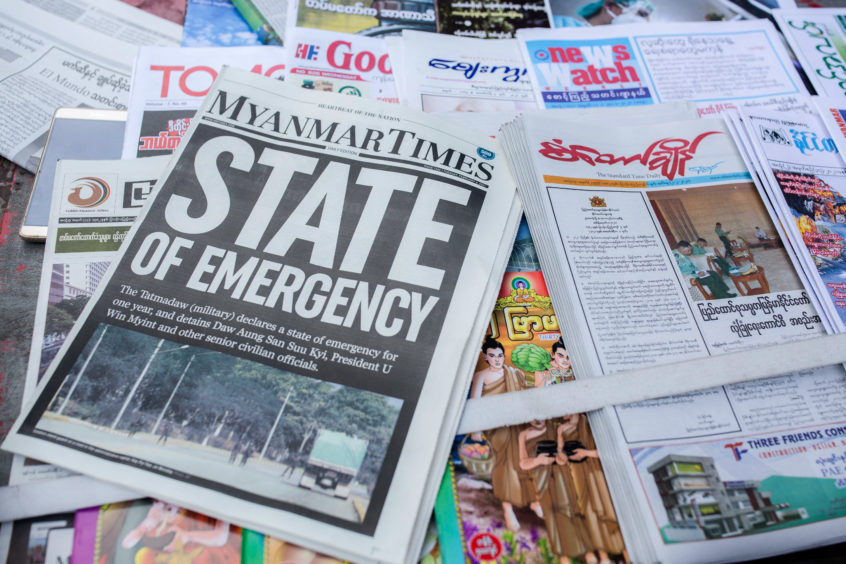
The bloodless military coup in Myanmar has triggered some upstream companies to assess whether they should activate force majeure clauses in their production-sharing contracts (PSCs) with the government.
“Upstream companies are assessing if they can continue drilling or production at the moment. It’s all very uncertain and I think companies are assessing whether the security situation has changed or not. The decision to claim force majeure will be very much on a project-by-project basis,” said Charles Magdelaine, a Yangon-based energy and infrastructure lawyer with VDB-Loi.
Energy Voice understands that companies exploring, such as operator Woodside Energy, which is carrying out a three-well exploration drilling campaign, would be more likely to invoke force majeure. Woodside’s partners include Shell, Myanmar Petroleum Exploration & Production, and China National Petroleum Corporation (CNPC).
“For companies carrying out drilling, they are mostly spending cash with uncertainty that they will make any discovery. So, I think they will be a bit more wary about continuing these operations,” the lawyer told Energy Voice.
Conversely, Energy Voice understands that companies producing hydrocarbons, such as Total, PTT Exploration & Production (PTTEP) and Posco International, and already generating cash would generally be happy to continue operating
Investors are also assessing how the military government might respond to force majeure requests, which could be used to seek an extension of a PSC’s exploration and production terms.
Activating force majeure in response to a coup should be fairly straightforward. However, companies will have to prove that the coup has actually hit their operations.
“Companies need to be able to show that they are not able to import equipment anymore or that the security situation on site is too dangerous for personnel to carry out operations,” said Magdelaine.
At some onshore projects, local governments have already instructed operators to cease work temporarily, pending further instructions from the new military-led central government.
“Some of the permits required to carry out obligations might be revoked,” warned the lawyer.
In addition to a PSC, upstream companies usually need a drilling permit and other permits issued by either the local government or various ministries to carry our operations. Offshore and onshore petroleum operators are waiting to see if they will be instructed to stop, said Magdelaine.
Adding to the uncertainty, it is not yet clear who will replace U Win Khaing as the new minister of energy and electricity. His two deputy ministers have both been sacked since the coup on Monday 1 February.
Still, the military-led government is trying to reassure the business community. “All the new appointees so far are very business friendly,” said Magdelaine.
Indeed, the military appears keen to resume the normal functions of the government it now controls. It has appointed a new cabinet of returning bureaucrats – including pro-business officials.
“The feeling on the ground, at least for the business community, is that the government is trying to reassure people that things will proceed as usual. That there is no real danger to foreign direct investment in terms of appropriation or any other type of revocation of projects,” added Magdelaine.
Significantly, it appears the main risks to foreign upstream companies operating in Myanmar are externally from the threat of international economic sanctions.
The U.S. is expected to impose new sanctions on those involved in the coup, particularly military officials and associated entities, said Kaho Yu, Asia analyst at geopolitical risk consultancy Verisk Maplecroft.
However, “any new sanctions will make it harder for responsible companies adhering to international best practice to keep operating in Myanmar due to reputational and ESG considerations,” added Yu.
“We are waiting to see the type and level of sanctions. Whether they are targeted or not. If they are targeted at military individuals and associated companies then they should have limited impact on foreign investors. Still, if sanctions are sector or country wide it would be catastrophic for the economy,” said Magdelaine.
“Operators, such as French major Total, which has been in Myanmar some 40 years and operated under international sanctions imposed on the military regime prior to 2012, know how things work,” he added.
Total operates the offshore Yadana field, which supplies gas to the domestic market and neighboring Thailand. It also holds stakes in several offshore exploration blocks.
Woodside Energy reported its drilling campaign remains on schedule and those supporting the drilling campaign are safe and accounted for.
“Access to key infrastructure, such as airports and helicopter services, has now been reinstated,” added the Perth-based company.
Transocean’s drillship Dhirubhai Deepwater KG2 last month spudded the first of the three wildcats that are being drilled on blocks A-7, AD-1 and AD-8.
